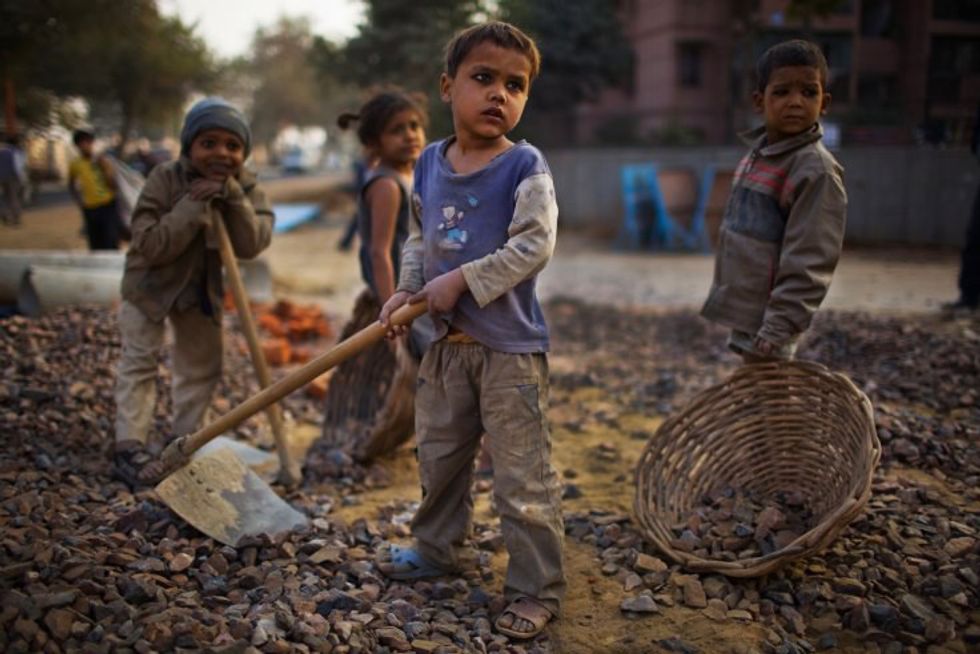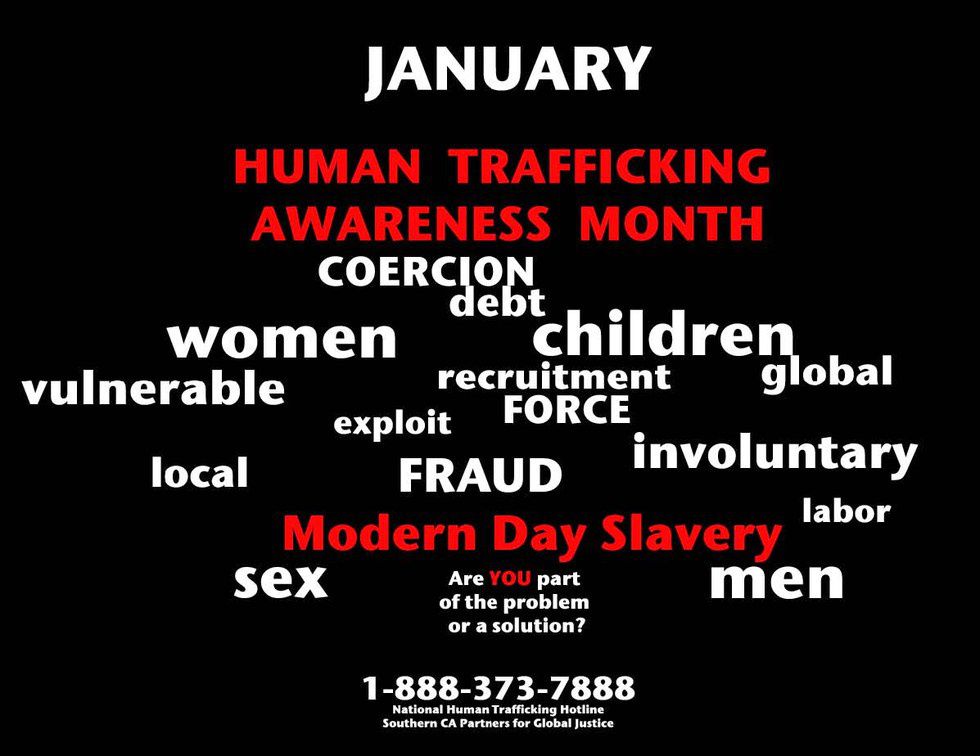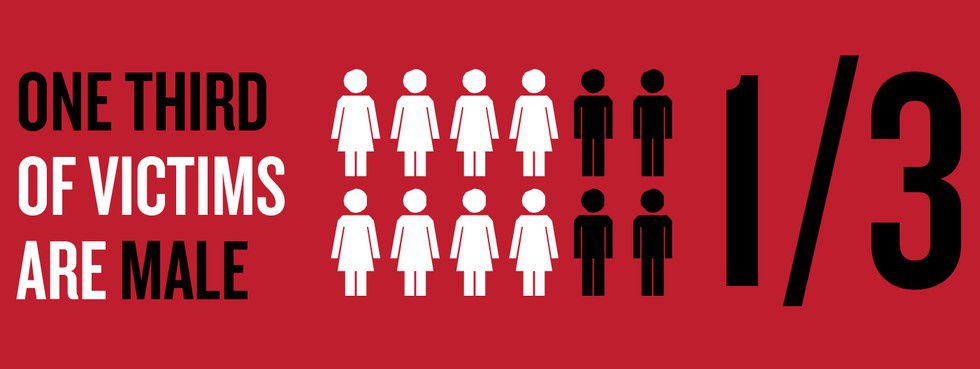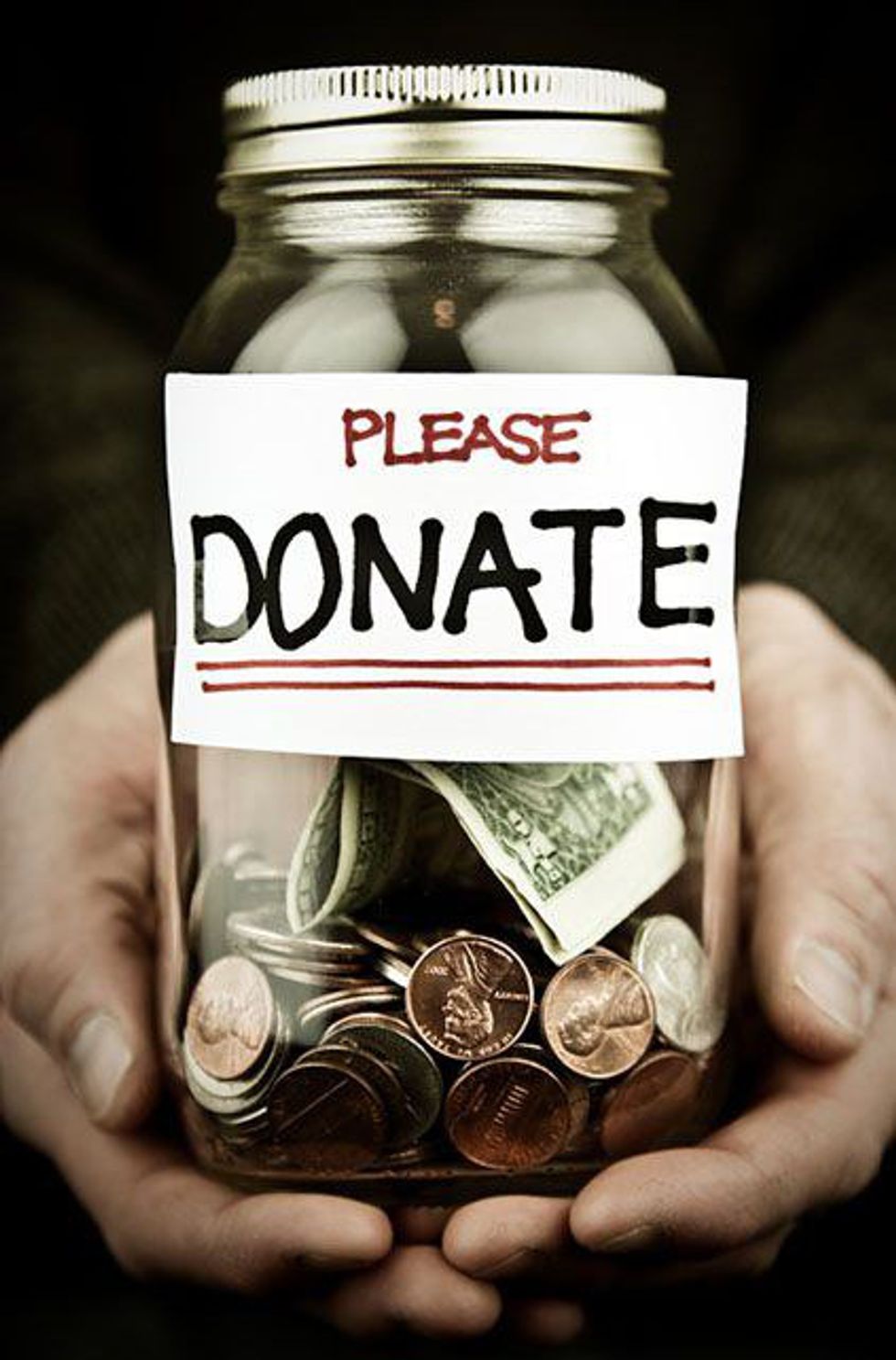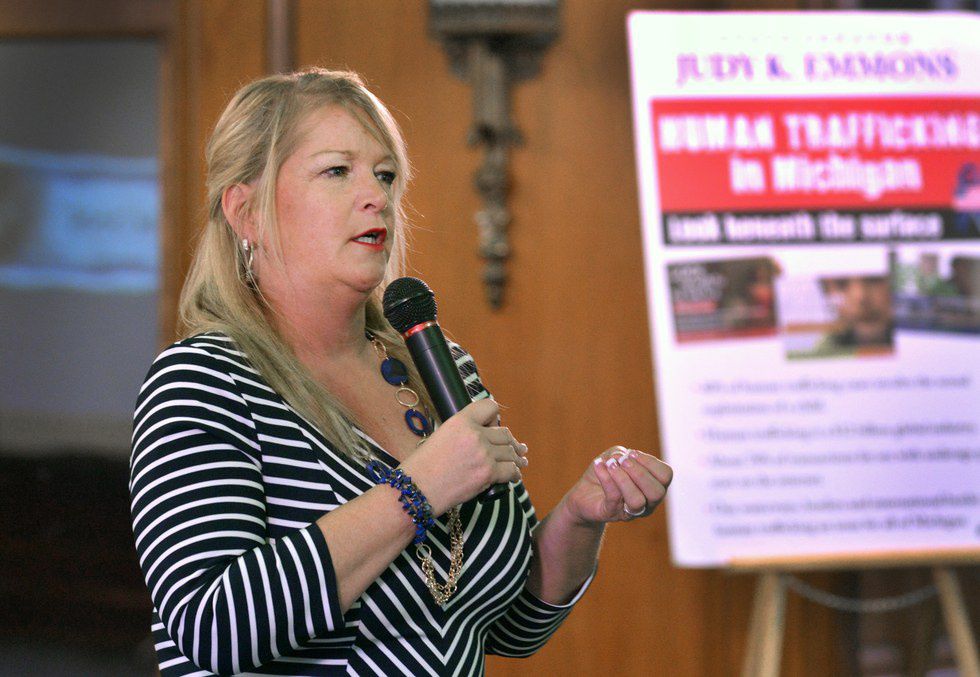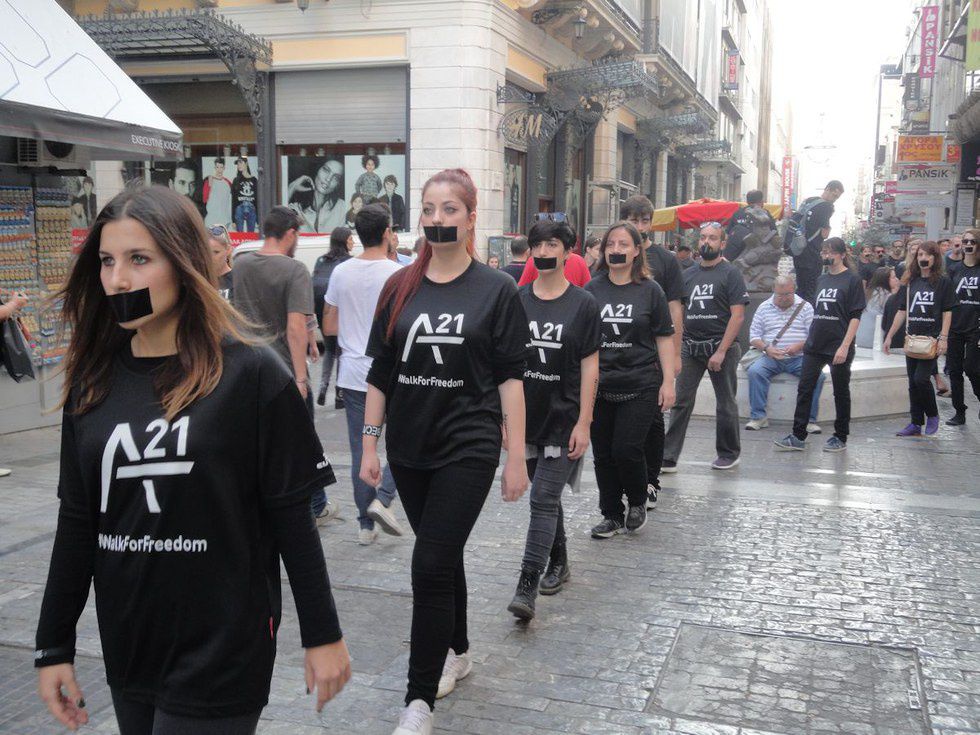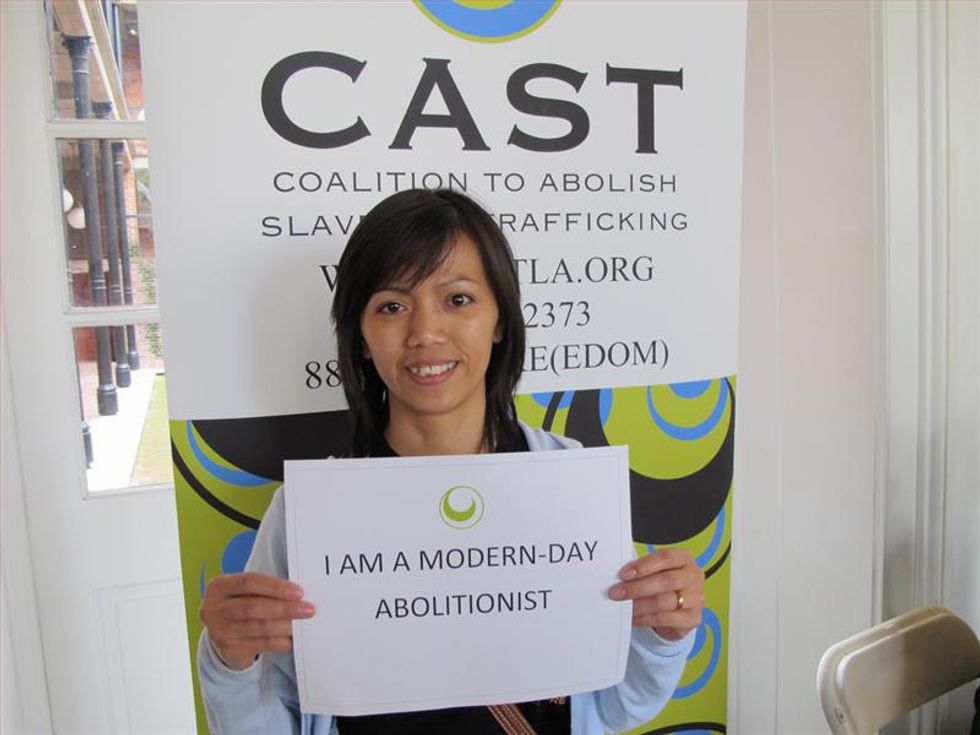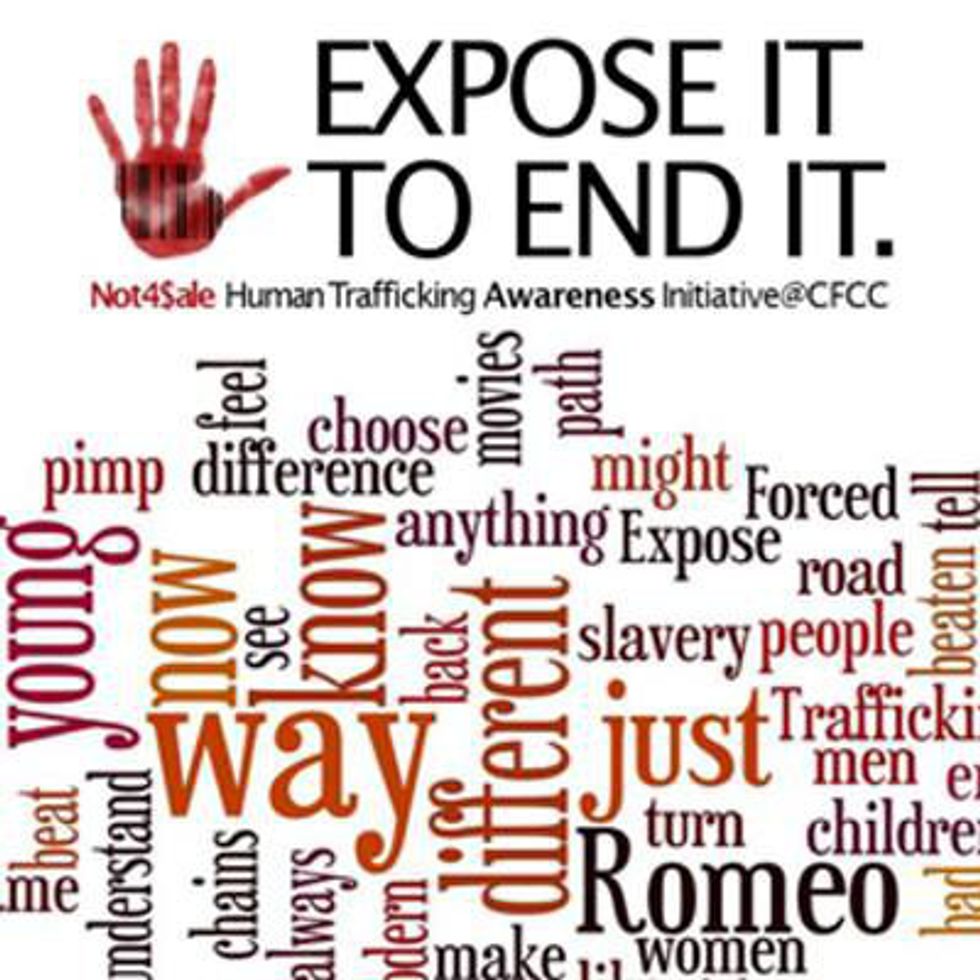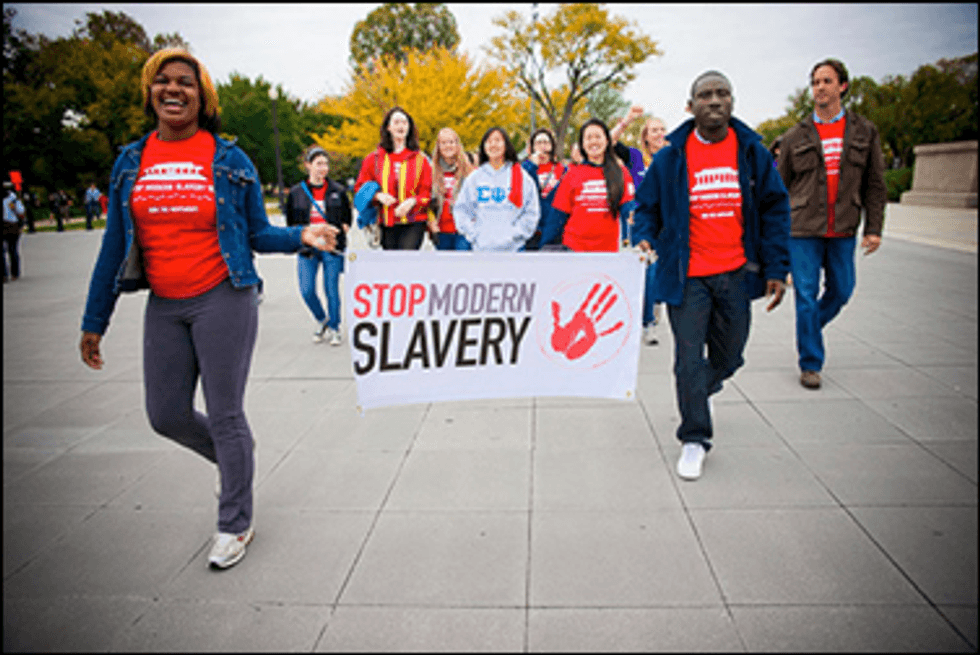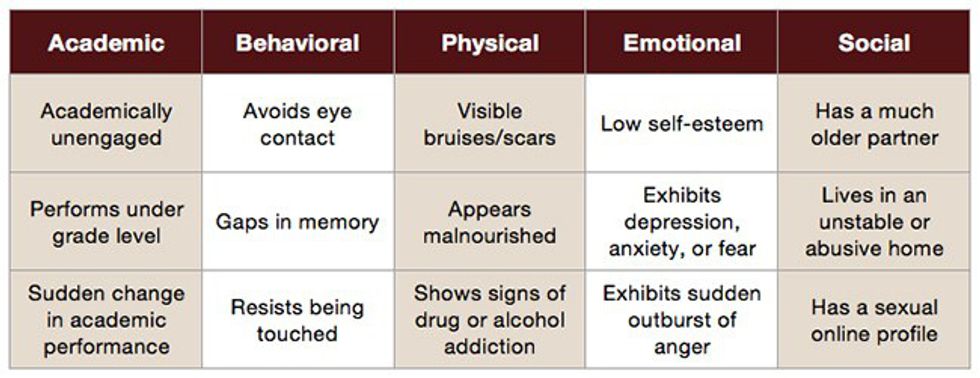Slavery doesn't exist in America, right? Wrong. People don't auction others publicly on a block like they did over a century ago, yet they still trade and sell other human beings for cheap labor or force them into the sex trade.
Human trafficking is a buzz word thrown around everywhere today in America, but how many people actually know what it is or how it affects them? The Office of Justice Programs states that human trafficking is a form of modern day slavery and includes " recruitment, harboring, transportation, provision, or obtaining of a person for labor or other services, through the use of force, fraud, or coercion, for the purpose of subjection to involuntary servitude, peonage, debt bondage, or slavery. It includes sex trafficking, in which a commercial sex act is induced by force, fraud, or coercion, or in which the victim is under 18 years of age," according to the Trafficking Victims Protection Act of 2000.
Unicef USA states that about 21 million people are trafficked around the world and that the industry earns about $32 million annually. A graphic on the organization's website reveals that the United States houses 1.5 million of these victims, but the majority lie in the Middle East and Southeast Asia. The United Nations Voluntary Trust Fund's fact sheet also reports that about 2.4 million people are forced into labor.
The U.S. Department of State's Trafficking in Persons report 2016 developed three tiers for countries with human trafficking. Tier one meets the TVPA minimum standards, tier two does not meet the standards but the country's government seeks to meet those. A subcategory, tier two watch list, includes countries with increasing number of victims, a failure to provide increasing efforts to combat trafficking, or is making commitments to take additional steps over the next year. Tier three includes countries with the highest trafficking rates that do not meet TVPA minimum standards or fight human trafficking.
World Atlas states that some of the countries with the highest human trafficking rates include Algeria, Kuwait, Yemen, Syria, Thailand, North Korea, Belarus, and Russia. According to Manna Freedom, the United States cities with the highest trafficking rates include Atlanta, Chicago, Dallas, Detroit, Las Vegas, San Diego, San Francisco, St. Louis, Tampa, and Washington, DC.
Human trafficking is a prevalent global issue that needs people passionate about combating injustice to increase awareness about its severity. If people rally together, numbers can continue decreasing and more people can help end the problem. Every individual effort counts. January is National Human Trafficking Awareness Month and is a great time to learn more about human trafficking as well as help others around the world. Here are 10 ways you can increase awareness about human trafficking.
1. Learn more about major organizations.
The United States alone has several anti-slavery and anti-trafficking organizations, which combat both sex slavery and forced labor. Some major organizations include Abolish Human Trafficking, A21, Run 2 Rescue, Polaris, Not For Sale, Coalition to Abolish Slavery and Trafficking, National Womens Coalition Against Violence and Exploitation, Coalition Against Trafficking in Women, Durga Tree International, The Samaritan Woman. Find others through this directory from Freedom4Innocence.
Browse these websites and learn more about each organization's projects, the types of trafficking they combat, read up on their statistics, check out any upcoming events,and discover ways to get involved.
2. Advocate for both male and female victims
It is typical for human trafficking advocates to raise awareness about female victims of the sex trade because males often taken advantage of them due to their gender. This is seen in some major organizations, who exclusively raise awareness for women and girls who endured the sex trade or sex slavery. However, sex slaves can also be males, so it is important to realize this issue affects both genders.
3. Donate
It seems simple, but donating can help provide necessary funds for both local and global groups. Even a few dollars can multiply as Jesus multiplied the little boy's few fish and loaves of bread in Matthew 14. Each person who sacrifices a bit of their earnings can create a domino effect that accumulates lots of support. Donations are especially effective if a church or school club unties and raises funds, then makes a collective donation to an organization.
4. Host a speaker or event
One of the girls on my floor during my freshman year at Biola hosted two speakers from the A21 Campaign, which was the first time I actually heard about human trafficking. Many people remain unaware of its prevalence, and small events like these where attendees receive time to ask speakers questions can help them learn more about ways they personally can become involved. Some suggestions for speakers include Holly Austin Smith, the Human Trafficking Center, Samara Lectures, and Bound No More. Another great idea is to invite someone who has interned for an organization that fights human trafficking or went on a missions trip where they encountered the issue to speak in front of other students.
Film screenings on campus can also benefit students. For example, a University of Alabama, Birmingham student created a documentary about human trafficking in Birmingham and screened it at the university. A panel discussion followed this screening. Curious students who hope to promote social justice may see flyers around campus or hear about an event through word-of-mouth, which can lead to increased attendance.
5. Attend an event or participate in an awareness week.
The best way to support any cause is to attend an event with other like-minded people and invite others to join. Events can create networking opportunities and provide opportunities to meet people from the local community and from other cities, states, and even countries. In addition, these events often allow attendees to speak with organization representatives or speakers at tables and during panel discussions.
Some cities host major events, including San Diego, which is one of the top seven cities battling human trafficking in the United States. The Survivor Leader Network of San Diego will hold the 2nd annual Freedom Now — an anti-human trafficking street fair — on Jan. 28 on the corner of Ohio Street and University Avenue from 11 a.m. to 4 p.m. and is only a short drive from any Southern California college campus. Like a traditional fair, the event features local artists and performers, musical acts, spoken word from students at Point Loma Nazarene University, organizations with informational tables, and food trucks. Speakers — local politicians and local law enforcement members — are the main attraction.
Awareness walks are another common event. A21's official Walk for Freedom is well-known and occurs each year in mid-October, including on Hollywood Boulevard in Los Angeles. During this walk, participants wear all black, including an A21 event shirt, and place black tape over their mouths. Over 300 walks occurred in over 40 countries last year, according to A21's website. Search or register for a walk near you here. The walks are open to all ages and no prior knowledge about human trafficking is required to participate. For more information about the walk, visit the organization's website.
6. Share personal stories on social media
It is possible you know someone who has experienced human trafficking on a local level. If not, some human trafficking organizations like A21 maintain a blog that shares true stories from trafficking victims. Since people often check their social media pages, sharing these stories on some social media platform like Facebook or Twitter increases the chance that someone will read their story, share it, and join the fight for human trafficking awareness.
You can also share your own experiences about volunteering or raising awareness. If you attend an event, post a picture and describe your experience — you never know who might see it and develop a similar passion.
7. Get involved on a local level
Indirect support like donating to an organization can help, but major changes can occur on the local level. Human trafficking advocates focus so much on overseas areas like Southeast Asia and sometimes overlook local cities like San Diego, where many others suffer from forced sex or labor slavery. Volunteer time at a local organization weekly, once a month, or a couple times a year and help reduce human trafficking rates in the Untied States.
8. Purchase merchandise
It may seem silly, but items from an organization's store can act as a conversation starter since people often ask about statements on shirts. Plus, you give back to an organization and help their cause. Some groups, such as Malia Designs and Good Paper, even sell items that human trafficking victims made. It's money well spent on cards, t-shirts, jewelry, or other accessories. A21, Fair Trade Winds, and Etsy are other great places to shop.
9. Start a club
Biola University started a human trafficking awareness club, "Breaking Chains," last semester. University settings often draw attention to social justice issues, so this is a great opportunity to find others on campus who are just as passionate about human trafficking and congregate together to host campus events, speakers, or volunteer for local organizations. This is a wonderful way to increase interest on campus about important issues. Reach out to friends or peers and spread the word.
10. Read books and articles or watch documentaries
It's hard to understand something without reading up on it. Search Amazon or a bookstore like Barnes and Nobles for titles specifically about human trafficking. Top titles include: "Not for Sale: The Return of the Global Slave Trade—and How We Can Fight It," "Sex Trafficking: Inside the Business of Modern Slavery," and "Girls Like Us."
Watch documentaries to visually understand what human trafficking victims endure and get ideas about possible movies to screen on campus.Recommended films include: "Cecilia," "Girl Model," "The Storm Makers," "The Abolitionists," and "In Plain Sight," narrated by Natalie Grant.
Want to read riveting research? Look for research studies, projects,and initiatives about human trafficking, including Combat Human Trafficking's Colorado Project or Point Loma Nazarene University's Abolish Human Trafficking resources. You can also search the internet for various resources. Examples include the National Human Trafficking Hotline Resource Library, research reports from Shared Hope, U.S. Department of State, or this press release from the White House.
11. Learn to spot signs
It's easy to think that human trafficking does not affect Americans, but the reality is it could happen right in your neighborhood. I used to believe San Diego was a safe place until I learned it is one of the most common trafficking areas in the United States. Although people believe they may not personally encounter any trafficking victims, they can still educate themselves about warning signs and prepare to take action if necessary.
The U.S. State Department offers a list of human trafficking indicators, questions to privately ask trafficking victims, and who to contact for help. A few indicators include someone living in poor conditions, with their employer, submissiveness, or any signs of abuse. Call the National Human Trafficking Hotline if you suspect any suspicious activity related to human trafficking.




